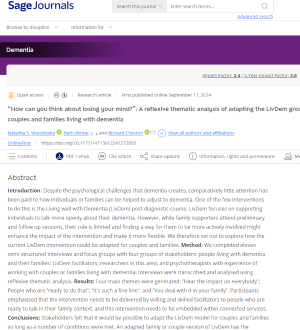LivDem could be adapted to help families and couples adjust to a dementia diagnosis
18 September 2024
The Living Well with Dementia (LivDem) course, a well-established group intervention that helps people adjust to a dementia diagnosis, could be adapted for families and couples, a new study published in Dementia: The International Journal of Social Research and Practice has found. The interview and focus group study was led by National Institute for Health and Care Research (NIHR) funded researchers at the University of the West of England.
LivDem is an evidence-based, structured approach that helps people who have recently been diagnosed adjust to their condition. It is an eight-week course attended by a group of between six and eight people living with dementia. Use of the LivDem approach is increasing, both in the UK and abroad.
However, some people would prefer to talk within their family rather than in a group. So the team, supported by the NIHR Applied Research Collaboration West, want to adapt LivDem for couples and families. This would give a wider range of people access to support to adjust to a dementia diagnosis. They call this approach LivDem-Families.
In the study, part of a wider project to develop LivDem-Families, the researchers conducted 11 interviews and focus groups with:
- People living with dementia and their families
- Existing LivDem facilitators
- Researchers in this area
- Psychologists who work with families
They found four main themes:
- Hear the impact on everybody
- People who are ‘ready to do that’
- It’s such a fine line
- You deal with it in your family
Participants emphasised that the intervention needs to be delivered by willing and skilled facilitators to people who are ready to talk in their family context. The intervention also needs to be embedded within connected services.
Stakeholders felt that it would be possible to adapt the LivDem model for couples and families so long as some conditions were met. Also, that an adapted family or couple version of LivDem has the potential to help people adjust to a dementia diagnosis. They thought it could also be incorporated into dementia pathways and delivered through the NHS and the voluntary sector.
The team will now do more research to find out whether delivering a LivDem-Families intervention will be possible, as well as looking at the evidence around these kind of interventions.
Dr Natasha Woodstoke, lead author of the study and Research Fellow at NIHR ARC West, said:
“Dementia profoundly affects both the person who’s been diagnosed, and the people close to them. People react to a dementia diagnosis in different ways.
“We already know that LivDem can help diagnosed people adjust. Now, with further research and careful implementation, we hope that LivDem-Families will also help people whose loved one has had a diagnosis.
“We hope that LivDem-Families will help families feel more confident and be less frightened by dementia. It could also help people talk more openly about it. Ultimately it could enable people to live well with a dementia diagnosis.
“We look forward to taking this research to the next phase of developing the intervention with families.”
Paper
